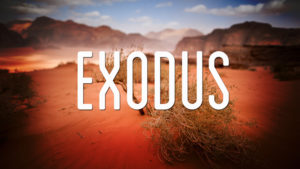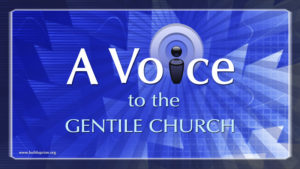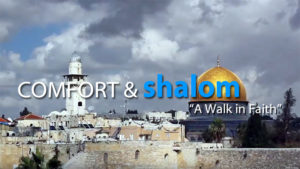 In this section of the Bible we will consider three different themes: Shabbat, the Golden Calf incident and what I will call the “test of Messiah”. The first subject is the Shabbat. God declared:
In this section of the Bible we will consider three different themes: Shabbat, the Golden Calf incident and what I will call the “test of Messiah”. The first subject is the Shabbat. God declared:
“But as for you, speak to the sons of Israel, saying “You shall surely observe My Sabbaths; for this is a sign between Me and you throughout your generations, that you may know that I am the Lord who sanctifies you.” (Exodus 31:13), and,
So the sons of Israel shall observe the Sabbath, to celebrate the Sabbath throughout their generations as a perpetual covenant. It is a sign between Me and the sons of Israel forever, for in six days the Lord made heaven and earth, but on the seventh day He ceased from labor, and was refreshed.” (Exodus 31:16-17)
So the Shabbat is a special sign signifying not only the God of the Bible but also His covenanted people among the human community. Note that the seven day period ending with rest on the seventh day follows the pattern God set in the creation event. So by observing Shabbat, God’s people declare that they serve the God responsible for creation.
In the 1st Century (AD/CE), the Church was seen as a part of Israel as Paul declared, “included in the commonwealth of Israel” (Ephesians 2:11-12). In the 2nd and 3rd centuries (AD/CE) Church leaders did not want to be identified with the Jewish People. In order to distinguish themselves as a separate people they began to set aside the first day of the week for worship. Sunday became the Christian Shabbat. I don’t know if they realized that by making this decision they were choosing not to identify with the God of creation. In the process, they did define another god. Later Moslems followed the same pattern in choosing a different Shabbat and another god for themselves. Christians moved the Shabbat forward one day while Moslems moved it back one day. Shouldn’t serious Christians correct this mistake (sin) and honor the God of creation on the day that He specified. One simple reason to do so is that the “false prophet” of Revelation has two horns (authorities) and looks like a lamb but speaks with the voice of Satan. The most likely identity of the two horns is institutional Christianity and Islam. Some Christian leaders are now proposing the institution of a new religious manifestation called Chrislam, a union of Christianity and Islam. This looks very much like the “false prophet” of the book of Revelation.
The episode of the “Golden Calf” reveals something almost amusing about human nature. How difficult it is for us to face our sin? After Moses was delayed on the mountain, the people decided that he had been consumed. They felt free to ignore the commandments recently received and requested that Aaron make an image of God. Aaron did so. The people worshipped the Golden Calf. When Moses confronted Aaron concerning this sin, Aaron responded in a most human way.
“And Aaron said, “Do not let the anger of my lord burn; you know the people yourself, that they are prone to evil. “For they said to me, Make a god for us who will go before us; for this Moses, the man who brought us up from the land of Egypt, we do not know what had become of him. And I said to them, Whoever has any gold, let them tear if off. So they gave it to me, and I threw it into the fire, and out came this calf.” (Exodus 32:22-24)
Earlier we are told that Aaron “fashioned it with a graving tool, and made it into a molten calf”. So Aaron’s explanation was – we threw the gold into the fire and out came this calf. This sounds like something a four-year old child would say, but, I’m afraid, it is typical of the response of most people when caught in sin.
Finally, I would like to consider the “test of Messiah”. When God saw that the people had rebelled by worshipping the Golden Calf, He decided to destroy the people and raise up another people to serve Him. He said to Moses,
“Now then let Me alone, that My anger may burn against them, and that I may destroy them; and I will make of you a great nation.” (Exodus 32:10)
This must have been flattering to Moses. God would make him the patriarch of a people through whom God would fulfill His promises to Abraham, Isaac and Jacob. However, Moses crucified any personal pride and ambition. He appealed to God on the basis of the only Bible that He had in that day. Moses said,
“Remember Abraham, Isaac, and Israel, Thy servants to whom Thou didst swear by Thyself, and didst say to them, “I will multiply your descendants as the stars of the heavens, and all this land of which I have spoken I will give to your descendants, and they shall inherit it forever.” (Exodus 32:13)
Moses appealed to God on the basis of the revealed revelation of that day. He asked God to be faithful to the promises which He had previously made to Abraham, Isaac and Jacob. This is the test of Messiah.
Consider how much different history would be if the early church had passed the “test of Messiah”. Six hundred years before the time of Jesus at the time of the dispersion God declared through Jeremiah,
“Thus says the Lord, who gives the sun for light by day and the fixed order of the moon and the stars for light by night, who stirs up the sea so that its waves roar; The Lord of hosts is His name: If this fixed order departs from before Me, declares the Lord, then the offspring of Israel also will cease from being a nation before Me forever. Thus says the Lord, If the heavens above can be measured and the foundations of the earth searched out below, then I will also cast off all the offspring of Israel for all that they have done, declares the Lord.” (Jeremiah 31:35-37)
Two hundred years after the time of Jesus, Origin, who is considered one of the “Fathers of the Church”, wrote concerning the Jewish people,
“One fact, then that proves that Jesus was something divine and sacred, is this, that
Jews should have suffered on His account now for a lengthened time calamities of such severity. And we say with confidence that they will never be restored to their former condition. For they committed a crime of most unhallowed kind, in conspiring against the Saviour of the human race in that city where they offered up to God a worship containing the symbols of mighty mysteries. It accordingly behooved that city where Jesus under went these sufferings to perish utterly, and the Jewish nation to be overthrown and the invitation to happiness offered them by God to pass to others,–the Christians”. (See Hebraic Roots, pg. 50)
Instead of maintaining what the Bible clearly said, they declared that God had rejected His people and started over with them. By doing so they initiated an entity which would forever be in conflict with the people of Israel. It is a sobering thing for a Christian to learn that the Jewish People consider Christians their most ancient and ardent foe. In these last days real spirit-filled believers must repent from this ancient historical sin and humbly identity with God’s people, Israel. (For a full discussion of these subjects, please get my book “Hebraic Roots”. Contact the office at Fellowship Church at 407.699.1011)


